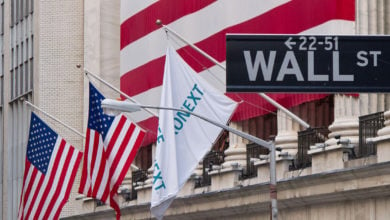A major scandal involving stock options has come to light in recent weeks that is causing great nervousness in corporate boardrooms and executive suites. The careers of many CEOs and other corporate chiefs are in potential jeopardy. A few may even go to jail.
In an Aug. 15 article, The Independent summed up the scandal this way: “In what amounts to systematic corruption,
 |
“As many as 2,000 companies may be involved,” the article continues. “So far, 85 have publicly admitted they are under investigation. Directors from nine companies have quit in disgrace. Six executives from two firms are facing criminal charges. Angry shareholders are lining up their lawsuits.”
Boosting executive ‘compensation’
The boards of directors of corporations whose shares are traded on the stock exchange often grant stock options to top executives as part—often a major part—of their “compensation packages.” This practice became especially widespread during the high-tech bubble of the 1990s. Executive compensation was often magnified by tens of millions, and in some cases hundreds of millions, of dollars above and beyond their already ample salaries.
And the practice continues. Yahoo! chief Terry Semel, for example, made $174 million on options last year, even though his salary was less than $1 million.
The granting of stock options is supposed to give strong incentive for corporate execs to “maximize shareholder value”—that is, run the company in such a way as to drive up the price of its shares. Often this has entailed having the company use part of its profits to buy up its own shares.
During the bubble years, it seemed as if stock options were the fount of nearly unlimited riches and rising stock prices benefiting not just the top bosses but also investors in the company shares. In many cases, workers were also granted stock options, though in much smaller quantities and on less favorable terms. Even workers who weren’t granted options could get in on the action by buying company shares for their 401(k) retirement accounts.
The idea was that giving workers a stake in rising share prices would encourage them to identify with the interests of the bosses and the big capitalist owners rather than their own class interests. As long as share prices continued to rise, this gambit met with considerable success. Soon workers were watching the fluctuations of their shares almost as intently as were their bosses.
Since the stock market bubble of the 1990s burst, most workers have grown far more skeptical of the potential for enrichment in the stock market. This is shown by the difficulty President Bush has encountered in selling his Social Security privatization scheme.
What are stock options?
Stock options give an executive or other grantee the right to buy shares, held in the company’s treasury and authorized for distribution, at a fixed price for several years into the future. When exercising the options, the grantee can either hold on to the shares acquired—in which case the shares must be paid for—or sell them immediately on the stock exchange—requiring no outlay of cash. The greater the share price rise before the options are exercised, the greater the gain. And such gains receive special, favorable tax treatment.
Before the Sarbanes-Oxley reforms of 2002, stock options could be legally granted “off the books”—that is, not recorded as a corporate expense—provided the exercise price of the options was the same as the price of the company’s stock on the day the options were granted.
The potential gain could be inflated, however, by pretending that the options were granted at an earlier date when the stock price was lower. This provided temptation for corporate bosses to pick a granting date sometime in the past. If the companies’ books could be cooked a bit, the potential option gains would be boosted and the option grants still did not need to be “expensed,” and so would not affect the bottom line. Judging from recent revelations, more than a few execs succumbed to this temptation.
Criminal fraud and other charges
The backdating of options is not explicitly illegal, but it is not allowed under most companies’ options plans. The Securities and Exchange Commission, the government agency that regulates corporate securities matters, is working with federal prosecutors to bring charges against executives that misled shareholders and allegedly hid their actions using faked internal documents.
Earlier this month, the former top boss and two other executives at Comverse Technology, a telecoms software group,
|
Last month, the SEC, the FBI and California prosecutors came down hard on former Brocade Communications Systems CEO Greg Reyes and former vice president of human resources Stephanie Jensen, charging them with federal securities fraud. Reyes and Jensen could receive 20 years in prison, along with $5 million in fines, for granting backdated stock options to employees between 2000 and 2004.
There is also likely to be chaos across the technology sector as companies sort out the accounting and tax mess that their deceptions have caused. Because stock options are now accounted for as an expense, companies who secretly backdated grants will have overstated their profits in recent years and may have to pay higher taxes in the future.
On Aug. 11, for example, Apple Computer announced that it might be forced to de-list from the Nasdaq stock exchange. It missed the deadline for filing its latest quarterly results, which will have to include significant changes to the old figures and possible reductions to future earnings projections. The company has a grace period, but it will have to meet Nasdaq requirements within the next couple of months.
Top Apple boss Steve Jobs received an option to purchase 10 million shares, dated on the stock’s lowest point in January 2000. News of the investigation into that and other executive grants sent Apple shares lower as investors feared the corporate celebrity, who founded the company 30 years ago, might be forced to quit. He also faces questions over another of his companies, Pixar, the film animation studio he sold to Disney last year. Two senior Pixar executives received options grants at low points for the share price.
At a rate of almost one a day, more and more companies are admitting that they are under regulatory investigation, but the scandal has taken a long time to unfold.
Maverick academics smelt something fishy
In 1997, David Yermack, now a professor of finance at New York University, noted the lucky timing of the average executive options grant, which appeared to come just before a strong rally in a company’s share price.
And as option grants became a bigger component of executive pay during the dot-com years, these “coincidences” became more frequent and striking. By the time Erik Lie, associate professor at the University of Iowa, compiled statistics on the subject in 2003, he could come up with only one conclusion, according to The Independent.
“The odds of executives being able to predict a rally in the share price over the next few days after a grant were simply astronomical. I thought it was clear they were cherry-picking dates from the past,” he said.
But Lie couldn’t find a publisher for his work. At this point, no company had been accused of backdating options, and editors found it hard to believe this was what was happening.
It was only in 2004 that the SEC stumbled across backdating at Mercury Interactive, the first tech company to admit to the practice. Prof. Lie sent his research to the agency. The SEC has since worked with him and other academics in its search for new companies suspected of fraud.
Lie’s latest studies continue to provide astonishing new evidence of systematic corruption. At 2,000 of the 8,000 companies examined, there were significant grounds for believing that option grant dates were chosen after the fact to maximize executive profit. And the introduction of Sarbanes-Oxley rules did not stamp out the practice.
Although companies are required to disclose options within two days of granting them, many have simply not complied with the rules and filed the information late. Even since 2002, one in eight grants still has the whiff of suspicion, Prof. Lie said.
Why the crackdown?
The major shareholders of corporate America are obviously angry about the stock options scandal and are insisting that the SEC crack down on the wrongdoers. But their anger is not primarily due to lying by their top-level corporate hirelings. The artificially inflated compensation reaped by these execs in effect plundered the companies they headed and cost all shareholders, but especially the richest families, substantial sums. Whether recorded as expenses or not, executive compensation in the form of option grants is not created out of thin air but comes out of the surplus value produced by the workers.
From the viewpoint of the capitalist owners, the corporate bosses have been taking more than their allotted shares, and that cannot be tolerated. And so heads will likely roll before the books are closed on this latest corporate scandal.






